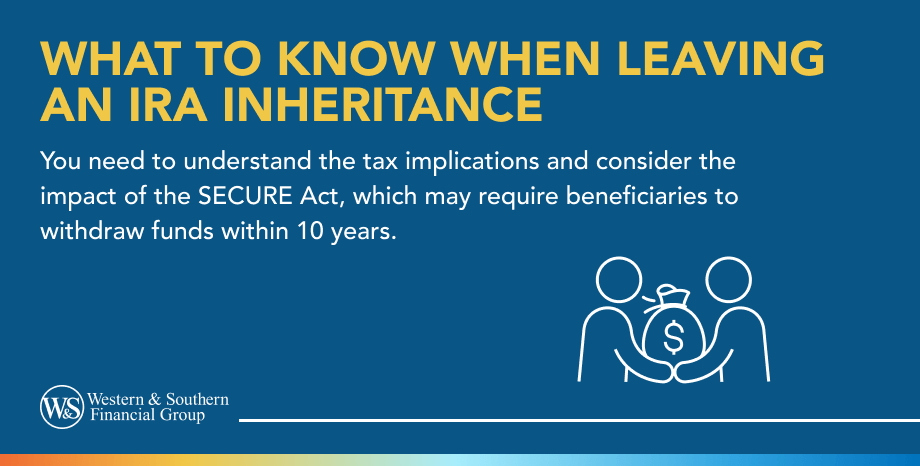

Table of Contents
Key Takeaways
- Legacy IRA or inherited IRA allows you to leave behind an inheritance that provides tax deferral benefits and gives you control over how your IRA is distributed to your beneficiaries after your passing.
- The rules for inherited IRAs are different from those of traditional and Roth IRAs. After the Secure Act of 2019, beneficiaries (excluding eligible designated beneficiaries) must distribute the entire balance of the inherited IRA within 10 years.
- Communication with your loved ones about your wishes and the potential benefits of using an inherited IRA as part of their retirement savings plan can be helpful in ensuring your legacy is used effectively for their financial future.
Chances are you already know about some of the advantages of individual retirement accounts (IRAs) when it comes to retirement. How about when it comes to leaving something to your heirs?
What Is a Legacy IRA?
A legacy IRA, also known as an inherited IRA or an IRA inheritance, is one way to leave behind an inheritance that could help you pass on the wonderful gift of tax deferral. An inherited IRA could be an essential part of your multigenerational wealth transfer strategy, as it gives you total control over your beneficiary or beneficiaries.
Imagine you have created a solid financial foundation for your retirement using a Roth or traditional IRA. As a result of your smart planning, you don't expect to deplete your IRA within your lifetime. Instead of spending down your IRA, you choose to draw from your savings and other investments to keep as much money in your IRA as possible.
When you pass away, the beneficiary of your IRA will then establish a new inherited IRA. If you have multiple beneficiaries, the funds in your IRA will be divided and disbursed as you've decided.
Legacy IRA Fundamentals
Inherited IRAs are treated differently than other types of IRAs, as inherited IRAs must be maintained as distinct accounts. Here's another key difference: The owner of an inherited IRA cannot postpone making withdrawals (and being taxed on those withdrawals) until he or she retires. For traditional and Roth IRA owners who die after December 31, 2019, the entire balance of the participant's account be distributed within 10 years to the beneficiary.1 However, there are exceptions to this 10-year rule for surviving spouses, minor children, those who are disabled or chronically ill and individuals not more than 10 years younger than IRA account owner - individuals referred to as eligible designated beneficiaries (EDBs).
Your EDB will face the infamous required minimum distribution (RMD), which is an amount that must be withdrawn from the account every year. However, instead of being required to start making withdrawals by age 70½ (for IRA owners born before July 1, 1949) or age 72 (for IRA owners born after June 30, 1949), your beneficiary will have to start making them by the end of the year following your death, and each year thereafter, according to the Internal Revenue Service (IRS).2
The RMD will be based on your loved one's life expectancy as calculated from the year following your year of death. Suppose your beneficiary turns 50 the year after you pass (and leave them the legacy IRA). The IRS will calculate his or her life expectancy using a single life annuity table, which will predict that your beneficiary will live another 34 years or so, meaning your beneficiary's RMD will be about 1/34th of the account balance for the inherited IRA in the first year.3 Because of changes in the SECURE Act of 2019, however, an IRA beneficiary who is not an EDB can no longer "stretch" RMDs from an inherited traditional or Roth IRA over their lifetime; the total balance of the inherited traditional or Roth IRA now must be distributed to the beneficiary within 10 years.
RMDs for inherited IRAs adjust every year, just as they do for traditional IRAs, as the beneficiary's remaining life expectancy shrinks. However, the beneficiary of your legacy IRA won't be subject to a 10% penalty for IRA withdrawals that begin before age 59½.
Because of changes implemented by the SECURE Act, beneficiaries who are not EDBs are no longer required to make RMDs and can withdraw money at any frequency as long as the account is empty by the end of this 10-year period following your death. In addition, in order for your beneficiary to avoid paying taxes fund on the earnings from an inherited Roth IRA, the account must have been funded at least five years before your death, according to the IRS.4 Roth IRA beneficiaries can withdraw contributions tax-free at any time, but they will pay taxes on earnings if the account is less than five years old when you die. Beneficiaries making withdrawals from an inherited traditional IRA will be required to pay taxes on this income.
Leaving a Legacy
Your loved one can make larger withdrawals than the RMD. This means your beneficiary can withdraw the entire sum of the inherited IRA whenever he or she chooses (and face the tax consequences with non-Roth IRAs).
Chances are, you're hoping your loved one will be as strategic about their retirement savings as you were. It could be helpful to discuss your wishes with your loved one, which might make them more inclined to use an inherited IRA as part of his or her own retirement saving plan.
An IRA inheritance could help you leave a legacy for your loved ones, which could also help them prepare for the road ahead. A financial representative can help you develop a plan for tomorrow — and have peace of mind for today.
Sources
- H.R.1994 - Setting Every Community Up for Retirement Enhancement Act of 2019. https://www.congress.gov/bill/116th-congress/house-bill/1994/text.
- Required Minimum Distributions for IRA Beneficiaries. https://www.irs.gov/retirement-plans/required-minimum-distributions-for-ira-beneficiaries
- Publication 590-B (2023), Distributions from Individual Retirement Arrangements (IRAs). https://www.irs.gov/publications/p590b#en_US_2017_publink1000231236
- Retirement Topics - Beneficiary. https://www.irs.gov/retirement-plans/plan-participant-employee/retirement-topics-beneficiary.

























